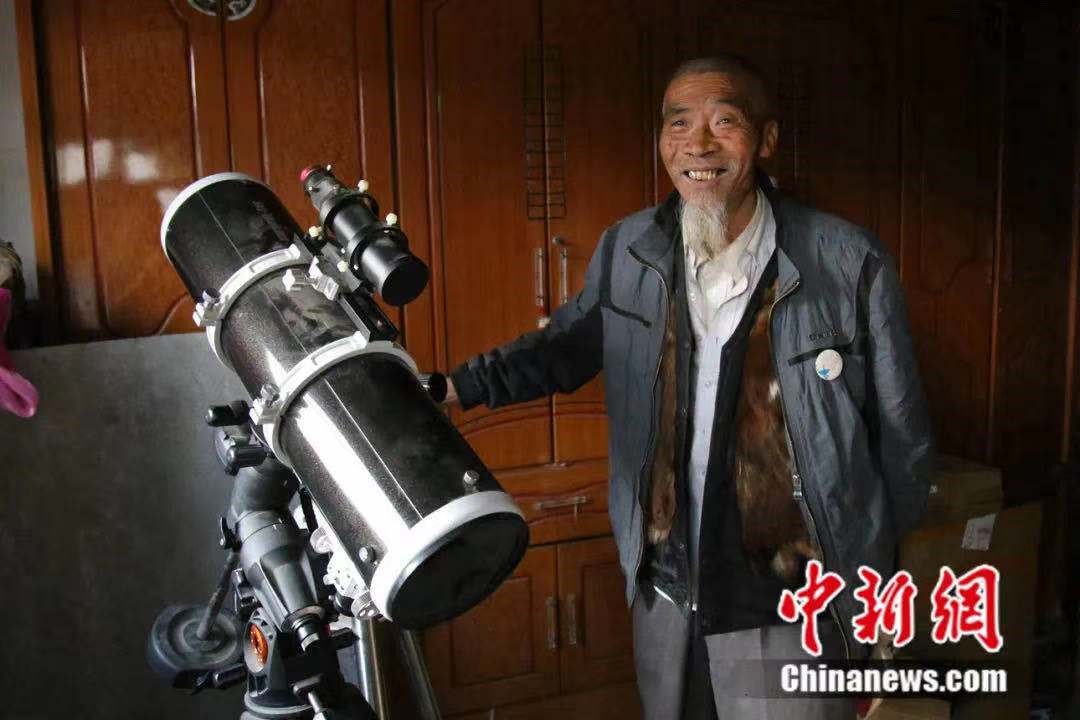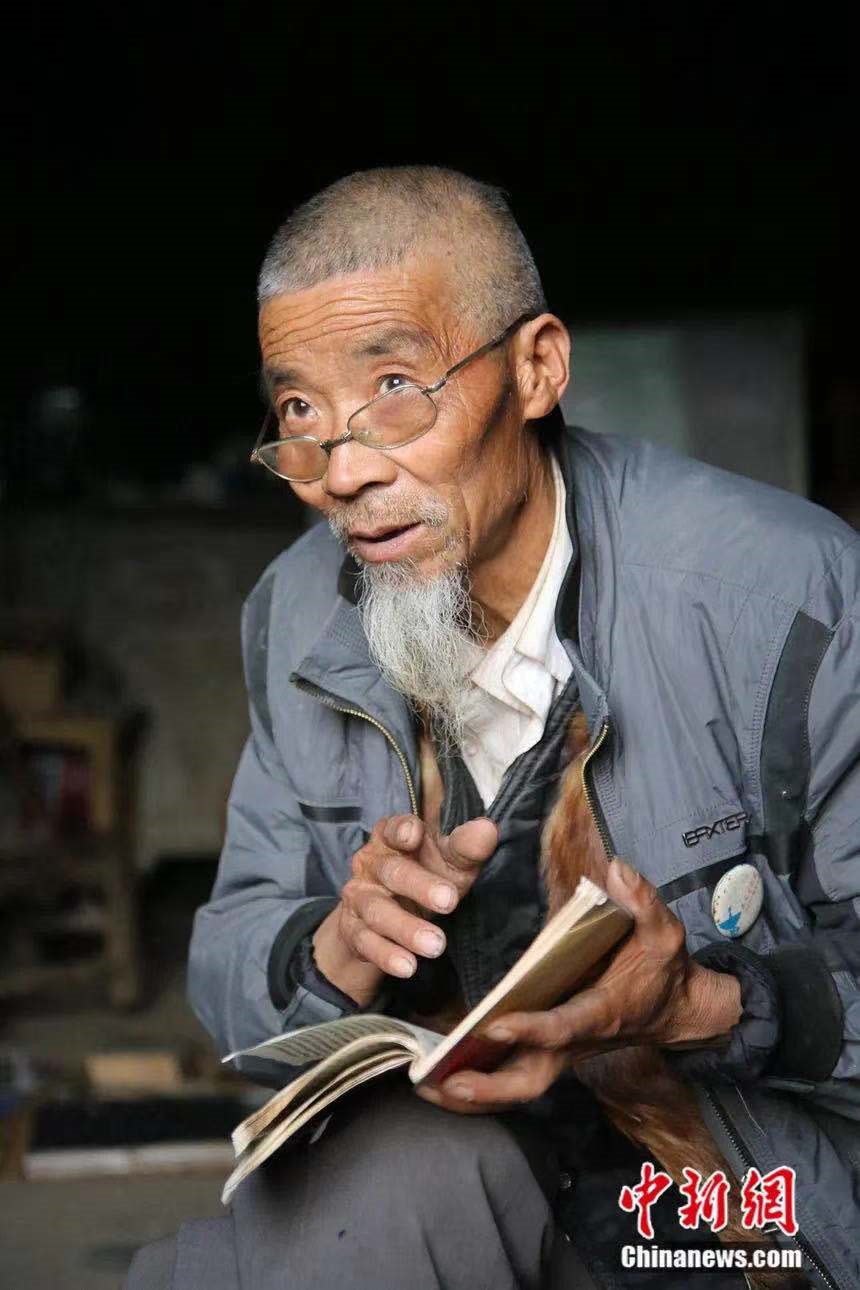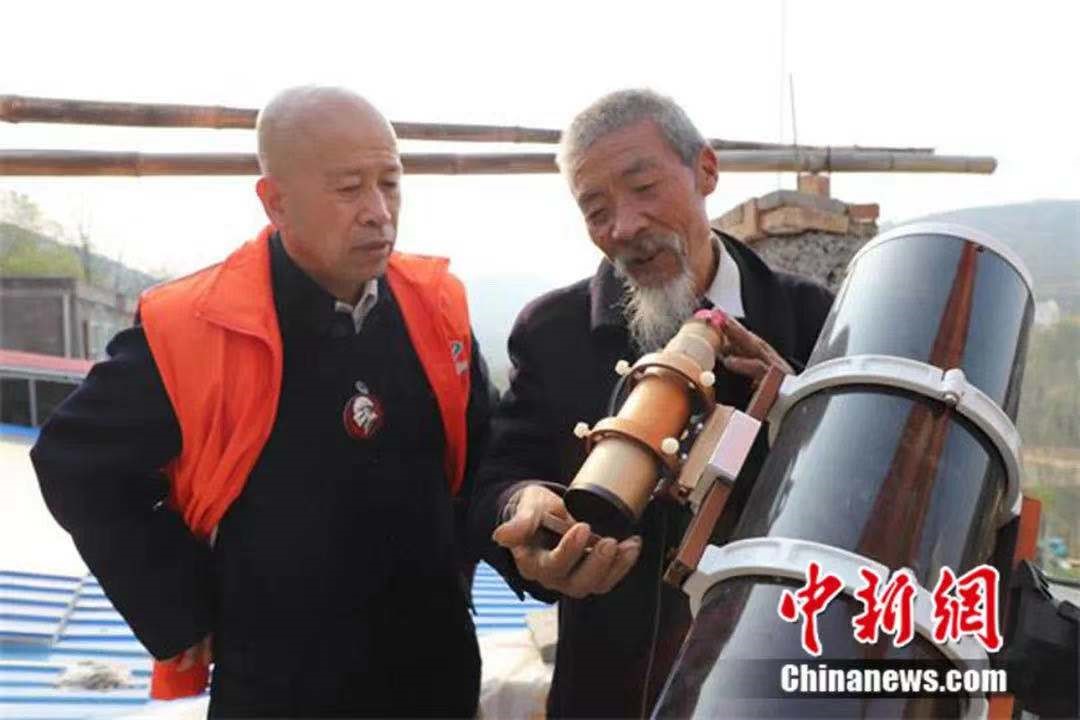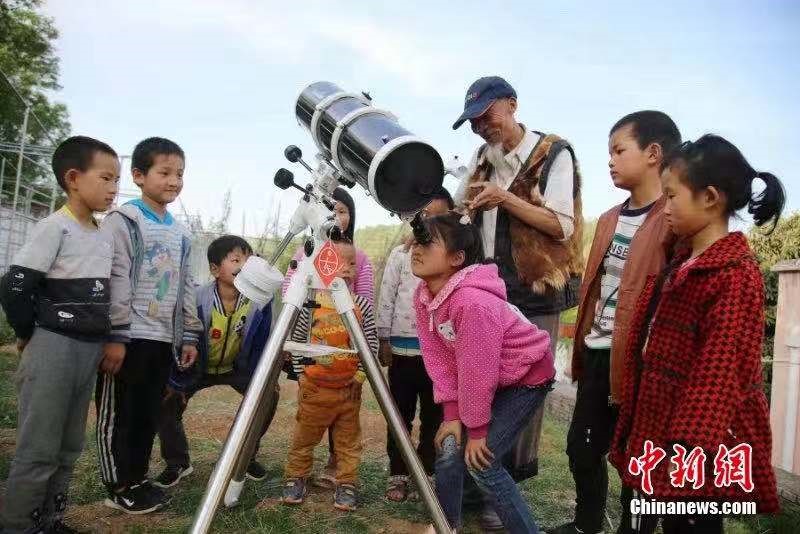


Wu Shiying and his large astronomical telescope, which is now the most valuable thing in his house. (Photo/Cao Zhonghong)
“Some people have never seen an eclipse of the sun in their whole lives, but I’m lucky enough to have seen it 11 times from the best viewing spots,” said Wu Shiying, a 71-year-old farmer in Meipu township, Yunyang district, Shiyan, central China’s Hubei province, China News Agency reported on Nov. 26.
Since seeing the spectacle of meteors streaking across the sky on a summer night when he was 14 years old, Wu has developed a keen interest in astronomical phenomena and a fascination for the subject.
In the early 1970s, Wu happened to read a magazine called “Amateur Astronomer” and has been subscribing to it ever since.
As he learned more from the magazine, he found out that the so-called meteor shower and the mythical story of a heavenly dog eating the moon are actually astronomical wonders, and his eagerness to explore the starry sky has grown with each passing day.

Wu reads an astronomy book. (Photo/Cao Zhonghong)
Despite being a poor farmer with just a junior high school education, Wu’s eyes light up when he talks about astronomy, and can speak eloquently on subjects like the Big Bang, galaxies, black holes, and wormholes.
Wu started to observe solar eclipses in 1997. Over the past more than 20 years, Wu has traveled to many parts of the country and even other countries at his own expense to observe the astronomical wonder.
He has seen the solar eclipse 11 times, and taken part in star parties on eight occasions.
On July 28, 2018, Wu attended the first national astronomical science popularization carnival and 2018 star party held in Qaidam Badin in northwest China’s Qinghai province, and even made a speech at the party. He was the oldest person to attend the event.
Each of his journeys to view solar eclipses lasted from ten days to weeks, during which Wu incurred considerable transportation costs.
In order to save money, Wu takes cheap hard seats on trains, eats food he prepared himself, and often sleeps outdoors at night.

Wu explains his astronomical telescope to a volunteer. (Photo/Luo Wei)
Over the past two decades, Wu has spent almost all his savings on watching solar eclipses in various places. The only valuable items in his house are astronomical telescopes and several boxes of astronomy books.
“Don’t underestimate this guy. I got it secondhand from a friend for more than 15,000 yuan ($2,284.50),” Wu told China News Agency, pointing to a large astronomical telescope and a set of projection equipment.
Many of his fellow villagers see Wu as a poor “lunatic” who likes watching solar eclipses.
Chinese netizens call him the “modern Kuafu”, a giant figure of Chinese mythology who spent his whole life chasing the sun.

Wu builds his own observatory with his son. (Photo/Cao Zhonghong)
While “chasing the sun” all over the world, Wu often visits observatories in various parts of the country, which inspired him to come up with the idea of building an observatory in his hometown.
In 2015, Wu started to build his own observatory in the mountain behind his family’s residence. Due to lack of funds, Wu and his sons have tried to use materials they can get locally and build everything on their own.
So far, the observatory has two platforms, and attracted many visitors from the city. Although it’s still a shell, Wu is grateful, as he finally has a place from which he can observe astronomical phenomena.

Wu teaches astronomy to children. (Photo/Cao Zhonghong)
Wu has also turned it into a simple astronomical education base for children in his hometown. He often takes his telescopes to nearby schools to teach students about astronomy.
“Apart for my two sons, who sometimes help me with the construction, most of my fellow villagers don’t think this is a good idea. But I won’t give up. As long as I’m alive, I will keep building the observatory until it’s finished,” Wu said with resolve.
“The mysterious and colorful starry sky makes people marvel at its beauty and fall into a reverie,” Wu said, adding that his greatest life wish is to complete the observatory and buy more equipment for astronomical observation, and eventually connect them to computers and projectors so that children can watch the stars on their screens.

 Award-winning photos show poverty reduction achievements in NE China's Jilin province
Award-winning photos show poverty reduction achievements in NE China's Jilin province People dance to greet advent of New Year in Ameiqituo Town, Guizhou
People dance to greet advent of New Year in Ameiqituo Town, Guizhou Fire brigade in Shanghai holds group wedding
Fire brigade in Shanghai holds group wedding Tourists enjoy ice sculptures in Datan Town, north China
Tourists enjoy ice sculptures in Datan Town, north China Sunset scenery of Dayan Pagoda in Xi'an
Sunset scenery of Dayan Pagoda in Xi'an Tourists have fun at scenic spot in Nanlong Town, NW China
Tourists have fun at scenic spot in Nanlong Town, NW China Harbin attracts tourists by making best use of ice in winter
Harbin attracts tourists by making best use of ice in winter In pics: FIS Alpine Ski Women's World Cup Slalom
In pics: FIS Alpine Ski Women's World Cup Slalom Black-necked cranes rest at reservoir in Lhunzhub County, Lhasa
Black-necked cranes rest at reservoir in Lhunzhub County, Lhasa China's FAST telescope will be available to foreign scientists in April
China's FAST telescope will be available to foreign scientists in April